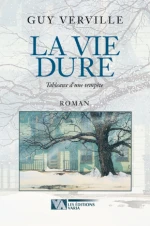
La Vie dure

Tonight, it will probably be the storm of the century. As the snow begins to fall and the wind becomes threatening, a writer goes from café to café, listens and observes. Some people laugh, others cry, some cheat their solitude in the illusion of the crowd, and others cut themselves off from the world to enjoy a moment of happiness.
But the storm became violent and nature, angry, forced men and women to face their lives. Among them, six paths stand out: Thomas, who wants to die on Mount Royal and fights hand-to-hand against his survival instinct; an older man, at the end of his life, who comes to say goodbye to books; Suzanne who loses her husband, her executioner; Fire, the arsonist, who is consumed in prison; a man who writes to his wife his amazement at being alive and in love; a young woman raped who tries to escape her suffering by climbing the mountain where she is insane. The sky may be angry; nothing is more poignant than these emotional storms that shake people's hearts. Thomas, Suzanne, Fire and all the anonymous people who meet the writer's gaze and imagination permeate and comfort our souls because they are each a part of us.
Out of stock. As Varia has ceased its activities, I have resumed my rights and plan to review and republish soon in ePub format.
Reviews
Rawness and poetry
It should have perhaps appeared earlier, in the heart of winter, this little book that risks going unnoticed in this belated early summer. The third work by Guy Verville, who had already given us short stories, "Le Putain" (Éd. Guernica, 1991), and a remarkable novel, "Crever mon fils" (Éd. Les Herbes rouges, 1993), "La Vie dure" presents itself as a narrative but reads like a novel. Everything takes place in one night, as the storm of the century rages in the sky and the streets of the city. A writer stops at a café, scrutinizes faces, listens to snippets of conversation, and writes. Inner storms are unleashed.
Guy Verville's prose is gripping, poignant, and breathless. His short sentences, initially seeming to lack fluidity, pause, restart, becoming a rhythm, a thought. We are inside the head of a man who, unable to bear suffering any longer, has decided to die, to end his boredom. Armed with a weapon, he wants to take advantage of the anonymity of the storm on the mountain. He has prepared and planned everything, except for the survival instinct of an animal. "With his arms still pointing towards the sky, he starts to cry. His body has won, made him lose a precious bullet and even more valuable time. He hadn't thought about the resistance of the body."
There are six stories, six individual dramas that unfold here, interspersed with the writer's wanderings in a universe where reality surpasses fiction. An old sick man enters a bookstore, disturbs a dreamy bookseller who didn't expect to assist someone in their death, in the midst of a storm. But the old man is strange, he has a lot to teach him, he will leave him changed after his departure. A wounded woman interrupts their tête-à-tête for a moment, flees: "Let people suffer, my God, let people suffer," said the old man.
Elsewhere, in a living room, a woman smokes excessively. She awaits the death of her husband, her liberation. The agony never ends. The author creates an atmosphere of suffocation, anticipation, and anguish. Time passes heavily. Life no longer makes sense. In a prison, two men love each other without saying it. The wounded, violated woman haunts the streets before licking her wounds on the mountain, in turn.
"La Vie dure," as its title indicates (The Hard Life), is not a joyful tale. However, through these daily horrors that Guy Verville tells with rawness and poetry, hope, the dream of a better future, and life that persists after the storm emerge.
An admirable hymn to life
From the very beginning, we plunge into the characters' despair, their miseries and conflicting emotions, only to be faced with a choice each time. To live or cease to exist. Instead of delving into melodrama and wallowing in it, the author concludes with solutions to each problem. It all comes down to the love of life. We never tire of reading these poignant stories that deeply resonate with us. "La Vie dure" is a vibrant portrait of people in the storm of existence and emotions. It is also an admirable anthem to life.